It is the dawn of 2011, the year of the revolution...
And many new songs are coming out of the Tahrir Square demonstrations: Sout Al Horeya and Matloob Zaeem by Cairokee, followed by Aida El Ayouby joining the band for the single Ya Al Midan (“O Square!”) This, in addition to numerous other musicians joining in the protest-inspired bonanza, recording their work in studios, performing on various stages, and a long-awaited change seems to be in the works.
As we listen to the chants-turned-songs, guitar, tabla and oud filling the squares and the streets, some are rejoicing as they welcome a new age, others worry about stability and security.
With the momentum sustained, the next few months bring about even greater transformation in the music sector and the festival circuit. New initiatives on the independent front add music to their line-ups.
October 2011 marks the first Hakawy International Arts Festival for Children, a captivating initiative. Preparations are underway for the first Downtown Contemporary Arts Festival (D-CAF) which, starting in 2012, will suffuse the city centre with international, multi-disciplinary contemporary art, maintaining its dynamism in the following years.
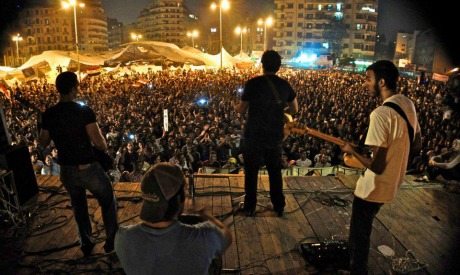
Cairokee band performs at Tahrir square in 2011
Young musicians continue to flourish with the help of independent institutions, such as the Culture Resource (Al Mawred Al Thakafy) which since its foundation in 2004, through various programmes, has supported the independent cultural sector in many Arab countries. On the official side of things, the Aswan International Festival for Arts and Culture, the Damanhour International Folk Festival and the International Festival for Drums and Traditional Arts are among the younger, post-2011 breed of festivals.
Dynamism is at its peak. And as we look at the scene, we are aware of the pillars that have generated it, together with many other names that contributed to that momentum through arts and specifically music. In 2011, we still have the icons of previous decades: Hassan El-Asmar, one of Egypt’s most famous pop stars; Amer Mounib, known for his albums Wayak (With You), Hob El-Omr (The Love of my Life), or Talaat Zein whose voice is featured in more cosy surroundings. Meanwhile the powerful voice of Warda, the Algerian rose, touches the soul with Egyptian Arabic songs and music.
On the classical music and dance scene, in 2011, we still have Abdel-Moneim Kamel, “the spiritual father of Egyptian ballet” who entered the revolutionary year as chairman of the Cairo Opera House. It is during his years at the Opera, that the Cairo Ballet Company has grown enough to present its most challenging repertoire while many renowned international troupes graced the main hall stage: from the Bolshoi Ballet to Fire of Anatolia.
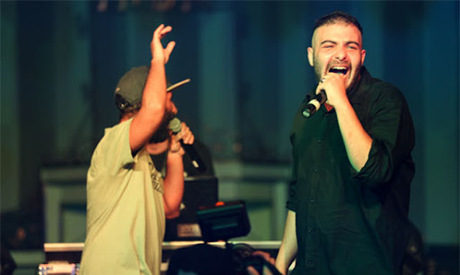
D-CAF festival's music performance
Fast-forward to 2013...
The street in front of the culture ministry building in the Cairo neighbourhood of Zamalek is filled with artists as they join the nationwide protests and what they call “Egypt’s fight for identity, threatened by president Mohamed Morsi and the Muslim Brotherhood.” The protesters say Culture Minister Alaa Abdel-Aziz has an «insufficient artistic and professional profile» for the job and his decisions reflect the government’s plan to «Brotherhoodise» Egyptian culture.
For classical musicians however the biggest blow comes when minister Abdel-Aziz fires the new chairperson of the Cairo Opera House, Ines Abdel-Dayem (other casualties include the heads of the Fine Arts Sector and General Egyptian Book Organisation). On 28 May, artists hold protests outside the Cairo Opera House, which lead to an on-stage strike the same evening at a performance of Aida, and the announcement of a three-day halt to performances. On 1 June, the Cairo Symphony Orchestra joins the strikes.
Meanwhile, every evening, artistic events take place on the street outside the ministry with artists occupying the building day and night. The performances feature many musicians including Eskenderella, Eman Bahr Darwish, Azza Balbaa, harpist Manal Mohei Eldin, marimba player Nesma Abdel-Aziz, and dancers from the Cairo Opera Ballet Company performing independently. The ballet performances and especially scenes from Zorba in which a solo by Hani Hassan is warmly applauded by bystanders present strong opposition to the current situation.
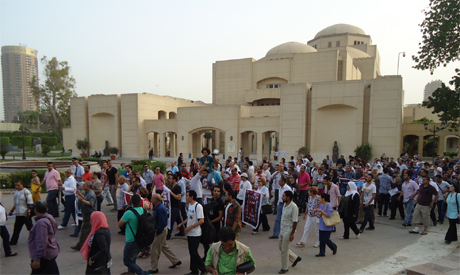
Protests in front of the Cairo Opera House, 2013
The dancers’ stance is additionally heated up by one of recent sessions of the Egyptian parliament’s upper house, in which an Islamist MP described ballet as “the art of nudity” and demanded its banning. Unfortunately, Abdel Moneim-Kamel does not live to see those developments; neither does Hassan El-Asmar, Amer Mounib, Talaat Zein or Warda, all of whom depart our world between 2011 and the early months of 2013. In September, they are joined by Ratiba El-Hefny, the renowned soprano, and the Cairo Opera House’s first chairperson upon its opening in 1988.
Despite the challenges, musicians continue working and growing while taking the opportunity presented by all eyes turned on Egypt to pave their way to international acclaim. It is now that Dina Al-Wedidi demonstrates how consistently she has been working on her musical growth. In 2012 she is awarded the Rolex Arts Initiative for promising international artists which allowed her to collaborate and receive mentoring from Gilberto Gil, the innovative Brazilian singer-songwriter, also known for his political commitment. Al-Wedidi will continue to be involved in the Rolex initiative through 2013 gaining a well-deserved boost. At the same time Maryam Saleh begins her international tours with Scandinavia and songs from her 2012 album Mesh Baghanny (I Don’t Sing).
The Alexandria-born Maii Walid 2013 album Moga is released in collaboration with renowned Lebanese musician Zeid Hemdan. Accordionist, songwriter and singer Yosra Al-Hawari’s success comes as a surprise with the 2012 release of her hit single Al-Sour (The Wall) and her artistic development bears fruit through 2013. The names multiply and international triumps come along. In the ministerial playground, Ines Abdel-Dayem is reinstated as the chairperson of the Cairo Opera House, a post she embarks on with a completely new energy. Opening the doors to young independent musicians and collaborations with foreign cultural centers, her policies are applauded by the beneficiaries while raising the eyebrows of musicians who wish to keep the opera house for the classical art forms only.
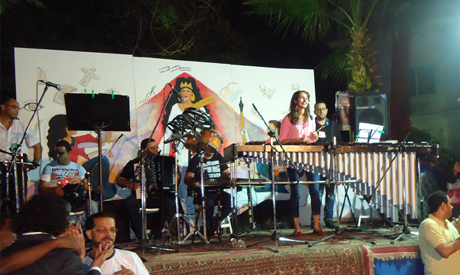
Nesma Abdel Aziz during performance outside the Ministry of Culture during a protest against the Muslim Brotherhood, 2013
Almost a decade has passed since 2011, and the dynamics have changed considerably. The scene has changed on the level of stages, street and managerial approaches, as if a whole era has passed. It is impossible to capture all the changes in one article. A fast look into just a few important events that took place between 2013 and 2020 will give us a better understanding on where we stand today.
Let’s begin with Al Mawred Al Thakafy suspending its activities in Egypt in November 2014 and moving its headquarters to Beirut. Mawred’s retreat was a significant step in the whole creative movement of the decade. Throughout its activities in Egypt, Mawred introduced or popularised numerous Arab musicians to local audiences, among them the Jordanian Autostrad and Akher Zapheer, the Palestinian Rim Banna, the Lebanese Yasmine Hamdan and Oumeima El Khalil, the Syrian Lina Shamamian and Kinan Azmeh. Mawred also opened an important window to countless Egyptian musicians working across the spectrum, through offering its stage at Al-Azhar Park (El-Genaina Theatre) to the production of albums and grants.
Mawred’s cultural feasts included the biannual Spring Festival running since 2004, Hayy, Ramadan’s annual festival, and CirCairo. And it is important to remember that Mawred was also behind the foundation of the Al-Darb Al-Ahmar Arts School teaching the circus arts and music to children and young people from economically deprived areas. With Mawred leaving Egypt, the new El-Genaina company took over management of the theatre and the school. However without Mawred’s network, connections and regional dynamism, it was difficult for any new management to resuscitate the previous sparkle.
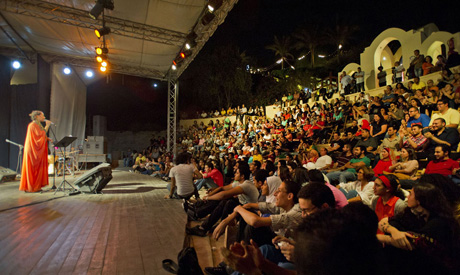
Concert at El Genaina Theatre, during Al Mawred Al Thakafy's management of the stage.
At the beginning of November 2016 Ahram Online reported, “the Central Bank of Egypt (CBE) decided to freely float the pound against the foreign currencies as part of a set of reforms aiming at alleviating a dollar shortage, eradicating the black market and stabilising the country’s flagging economy. Since the CBE’s decision, the pound’s rate against the US currency has been devaluing to register an average EGP 18 [in December] per dollar from EGP 8.8 before.”
Coming in the middle of the season, the sudden floatation of the Egyptian pound created a serious financial crisis for many institutions who included foreign performers in their plans.
It was at this time that Ines Abdel-Dayem had to postpone or even cancel several international commitments and redirect the programming to local troupes. Both Ahmed El-Attar, the artistic director of D-CAF and Mohamed El-Ghawy, the director of AFCA Foundation for Arts and Culture and founder of Hakawy festival, expressed their concerns about financing the upcoming festivals.
But in time both thankfully survived and they continue to bring many interesting artistic activities to Cairo. The financial blow hit the scene at large and it took several years for each cultural institution to find new strategies while redirecting its priorities.
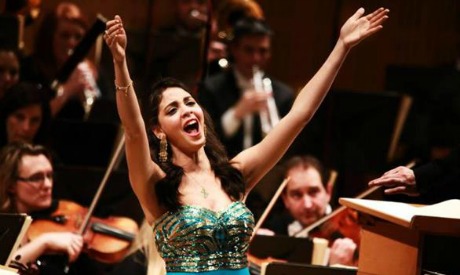
Egyptian soprano Fatma Said
One always looks for the silver lining however, and in the last few years, many talents gained international recognition and even a few examples can shed light on their strengths. Let us underline the soprano
Fatma Said, whose career has flourished internationally, as she moved from La Scala Academy in Milan to being selected by BBC Radio 3 to take part in its New Generation Artist Scheme from 2016 to 2018, releasing her long awaited debut album Al Nour in 2020. In 2018, tenor Ragaa Eldin was awarded the Tenor of the Year prize offered by the Puccini Academy and Amici del Festival Pucciniano. Conductor and composer Hisham Gabr was named Knight of the Order of Arts and Culture (Chevalier de l’ordre des Arts et des Lettres) in France, while composer Rageh Daoud was honoured in Mauritania by the Mauritanian President Mohamed Ould Abdel-Aziz for composing a new national anthem.
Dina El Wedidi, Youssra El Hawary, and Mohamed Abozekry and Karkadé embarked on an extensive US tour in September and October 2018. In the same year, Maryam Saleh, Maurice Louca and Tamer Abu Ghazaleh’s album Lekhfa (2017) won them the Best Artist, Duo or Group in African Rock at the fifth AFRIMA in Accre, Ghana. With the dawn of 2019, the Egyptian oud player, composer and music educator Mustafa Said was announced winner of the Aga Khan Music Performance Award, in Lisbon, Portugal. The same year Dina El-Wedidi’s name returned once again when she was featured on Time magazine’s Next Generation Leaders list (2019).
The musical theatre company Fabrica’s video Mercury Rising: A Queen Tribute won in the Music Video category at the ninth annual MoziMotion Festival in the Netherlands (2019). Two 13-year-old Egyptian singers won awards at the 11th Festival for Maqam Singing held in Baku, Azerbaijan (2019): Mahmoud Ahmed Awad won first prize while Kareem Mohamed Ahmed received the honorary award. Egypt’s band Cairokee gave their first ever concert in Paris at the end of 2019. That year, the Canada-based Egyptian musician Cherine Amr signed an agreement with Universal Music MENA record label beginning her journey with them by releasing a song Esmi (“My Name”). Meanwhile our eyes are on excelling in Arabic repertoire and Oriental ethno jazz, the young singer and songwriter Nouran Abu Taleb who began coming into the spotlight. Her unique vocals and dedication to the craft is among the brightest hopes in the music field. The list of talents, awards and other recognitions is endless…
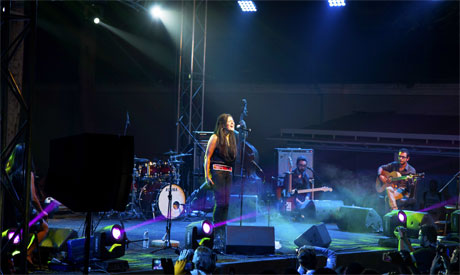
Egyptian singer Dina El Wedidi in concert
An important phenomenon of those years – motored by the need to go independent – is the formation of new ensembles incorporating professional musicians who until that moment would limit their work to the governmental institutions. The Al Sakia String Orchestra conducted by its founder Mohamed Saad Basha brought classical music to El Sawy Culturewheel in the early 2010s. Since 2012, the Awtar quartet consisting of professionally trained musicians enriched unexplored locations with their unique programmes. By 2014, their musical interventions had become popular at locations operating in underprivileged neighbourhoods.
From the Mediterranean shore, the Bibliotheca Alexandrina’s Arts Centre saw a significant revitalisation with the arrival of its new director, composer and conductor Hisham Gabr in 2014. Among the many changes Gabr introduced in his three-year directorship was the revival and expansion of the Bibliotheca Alexandrina Summer Festival, the launch of the Contemporary Theatre Festival and the Jazz Tales Festival, development of the Bibliotheca Alexandrina Chamber Orchestra and Choir.
Egypt’s independent bands keep counting their new singles and albums. Again, enumerating them is not possible in just one article yet each success raises our chapeau. Following its brief revival at the beginning of the 2010s, the metal music scene continues to trouble the Musicians Syndicate. Equally challenging for the syndicate is the ever-growing trend of mahraganat musicians whose listeners number in the tens of millions on YouTube but find it difficult to go on stage. The watchful eyes keep following music productions, the lyrics and the musicians’ influence on the audience.
Meanwhile, in 2018, when Ines Abdel-Dayem was appointed Egypt’s minister of culture, one of her first ministerial decrees was the appointment of a new chairman, Magdi Saber, who to date duly follows strategies implemented by Abdel-Dayem since 2012.
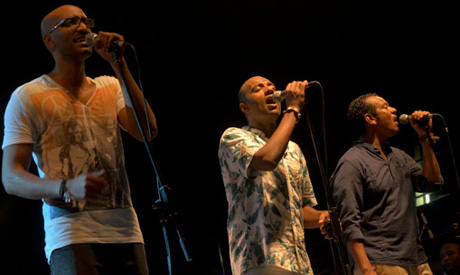
Black Theama band
But the most important event in 2020 is the pandemic that struck the globe and affected people across all fields. Equally Egypt’s music scene was trapped after 9 March when the Culture Ministry suspended all activities (following Prime Minister Mostafa Madbouly’s decision to put off large gatherings until further notice), until its semi-revival in July. The pandemic made it difficult for the musicians, DJs, and technicians to make ends meet, it left hundreds in debt, forcing others to change careers. Cultural institutions and music studios also suffered great losses, some closing their doors indefinitely and in silence.
Today operating under many restrictions, the scene has still not returned to its normal state. Though many artists did and continue to provide amazing activities, many moved online, but they need to return to regular work dynamics in order to make survive financially. In this context the biggest victim of the pandemic is the sector known as the Haram Street Forum. Consisting of thousands of musicians who work in clubs, tourist boats, weddings and other celebrations across Cairo and other cities, until date, this sector still remains in large part paralysed.
It would not be right to close this article without paying special tribute to many musicians we lost on the way and whose absence has changed the face of Egypt’s music scene, In addition to those mentioned at the beginning, we cannot forget composer and oud player Ammar El Sheraei (died 2011), singer Mohamed Nouh (2012), musician Mohamed El-Ezabi (2013), singer and actress Shadia (2017), composer and ethnomusicologist Halim El-Dabh (2017), singer Mohsen Farouq (2017), singer, founder and principal dynamo of Les Petits Chats band Wagdi Francis (2017), singer and poet Ghazali (2017), Egypt-based Sudanese conductor-composer Ali Osman Alhaj (2017), opera singer, actor and cultural activist Hassan Kami (2018), accordion player Saleh El-Artist (2018), composer and violinist Michel El-Masry (2018), guitarist Marwan Shaaban (2018), percussionist and composer Hossam Ramzy (2019), shaabi singer Shaaban Abdel-Rehim (2019), singer Samir El Eskandarany (2020), conductor and producer Tarek Akef (2020), Egypt-based Georgian pianist and music professor Elena Dzamashvili (2020), poet and lyricist for Egypt’s best-known independent musicians, Mido Zoheir (2020), composer known for his 1980s and 90s pop hits, Khalil Mostafa (2020), Egypt-based British pianist and vocal coach David Hales (2020), among others.
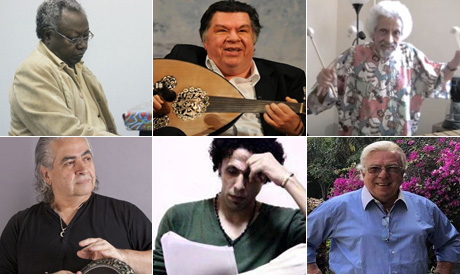
Some of the many musicians who passed away between 2011 and 2020. L to R (top): Ali Osman Alhaj, Ammar El Sheraei, Halim El-Dabh. L to R (bottom): Hossam Ramzy, Mido Zoheir, Hassan Kami.
*A version of this article appears in print in the 24 December, 2020 edition of Al-Ahram Weekly
Short link: